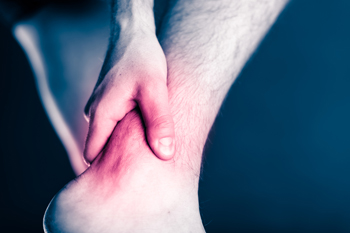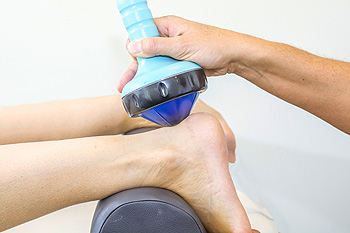 Ankle pain can have a variety of causes. While an ankle sprain may have an obvious cause, usually by rolling the ankle, there are plenty of more subtle injuries that can occur. These subtle injuries can include an ankle impingement which is a wedging at the front of the ankle, or an avulsion fracture, meaning a small piece of bone fractures away from the main bone due to the pull of a tendon or ligament that is attached to the bone. Tarsal tunnel syndrome is the pinching of the nerve that runs through the ankle, and even various forms of arthritis are all potential causes of ankle pain that will require treatment from a podiatrist. Once a diagnosis has been made, a podiatrist can then minimize pain and customize a treatment plan that is right for you.
Ankle pain can have a variety of causes. While an ankle sprain may have an obvious cause, usually by rolling the ankle, there are plenty of more subtle injuries that can occur. These subtle injuries can include an ankle impingement which is a wedging at the front of the ankle, or an avulsion fracture, meaning a small piece of bone fractures away from the main bone due to the pull of a tendon or ligament that is attached to the bone. Tarsal tunnel syndrome is the pinching of the nerve that runs through the ankle, and even various forms of arthritis are all potential causes of ankle pain that will require treatment from a podiatrist. Once a diagnosis has been made, a podiatrist can then minimize pain and customize a treatment plan that is right for you.
Ankle pain can be caused by a number of problems and may be potentially serious. If you have ankle pain, consult with one of our podiatrists from Foot Health Center of Merrimack Valley. Our doctors will assess your condition and provide you with quality foot and ankle treatment.
Ankle pain is any condition that causes pain in the ankle. Due to the fact that the ankle consists of tendons, muscles, bones, and ligaments, ankle pain can come from a number of different conditions.
Causes
The most common causes of ankle pain include:
- Types of arthritis (rheumatoid, osteoarthritis, and gout)
- Ankle sprains
- Broken ankles
- Achilles tendinitis
- Achilles tendon rupture
- Stress fractures
- Bursitis
- Tarsal tunnel syndrome
- Plantar fasciitis
Symptoms
Symptoms of ankle injury vary based upon the condition. Pain may include general pain and discomfort, swelling, aching, redness, bruising, burning or stabbing sensations, and/or loss of sensation.
Diagnosis
Due to the wide variety of potential causes of ankle pain, podiatrists will utilize a number of different methods to properly diagnose ankle pain. This can include asking for personal and family medical histories and of any recent injuries. Further diagnosis may include sensation tests, a physical examination, and potentially x-rays or other imaging tests.
Treatment
Just as the range of causes varies widely, so do treatments. Some more common treatments are rest, ice packs, keeping pressure off the foot, orthotics and braces, medication for inflammation and pain, and surgery.
If you have any questions, please feel free to contact one of our offices located in North Andover, and Tewksbury, MA . We offer the newest diagnostic and treatment technologies for all your foot care needs.


 Plantar hyperhidrosis
Plantar hyperhidrosis
 Shockwave therapy
Shockwave therapy





